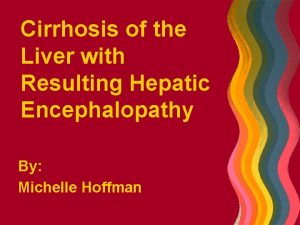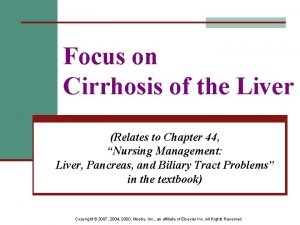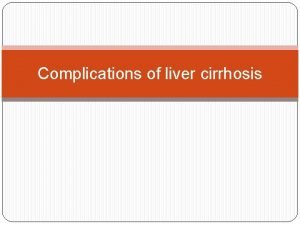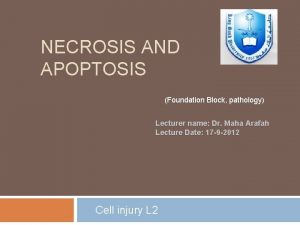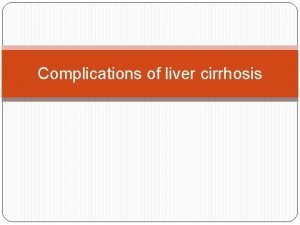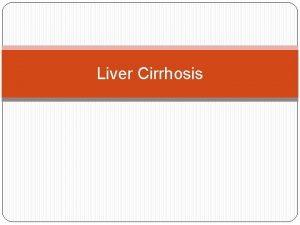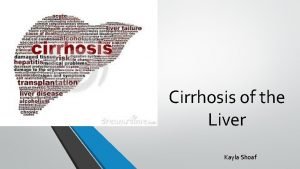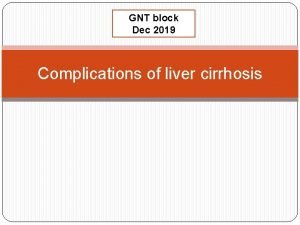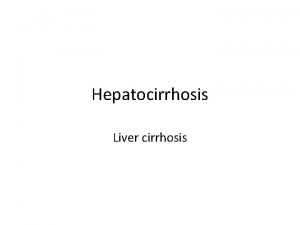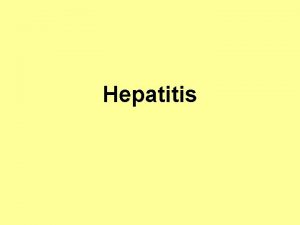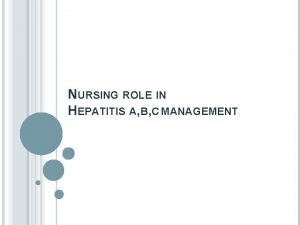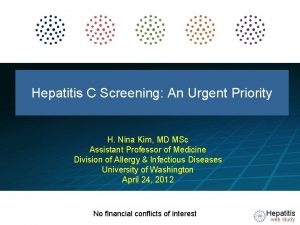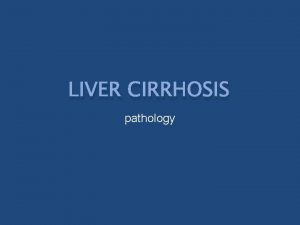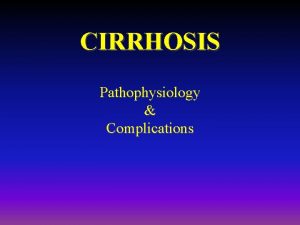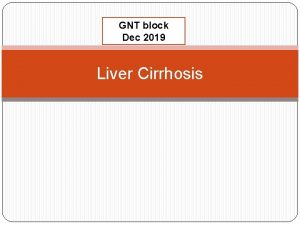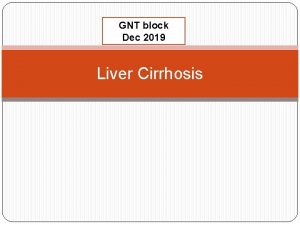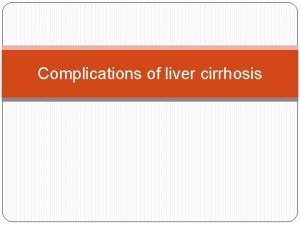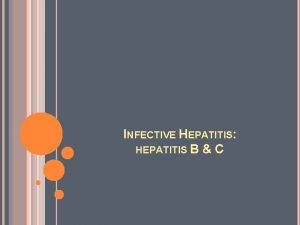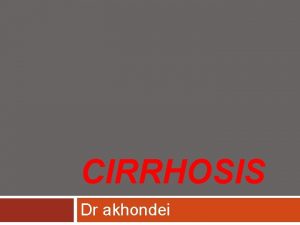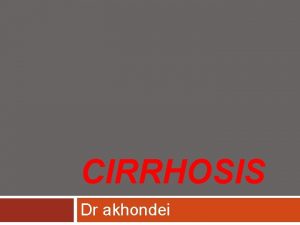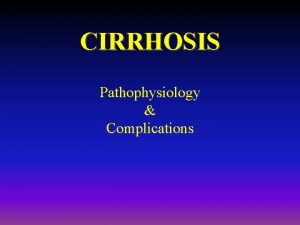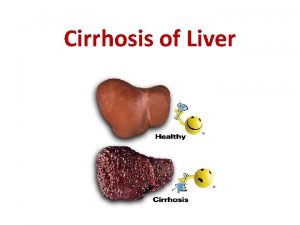Hepatitis C Cirrhosis Liver Cancer What Causes HCV

















- Slides: 17

Hepatitis C Cirrhosis & Liver Cancer

What Causes HCV? • Caused by hepatitis C virus • The virus is bloodborne • Virus mainly attacks liver cells • Hepatitis C infection can be either – Acute – Chronic

Acute Hepatitis C Increasing in Young American Adults • New infections dramatically increased in number from 2010 to 20131 • An estimated 29, 718 new HCV infections occurred in 2013. 1

Figure 4. 2. Incidence of acute hepatitis C, by age group — United States, 2000– 2013 Source: National Notifiable Diseases Surveillance System (NNDSS)

How Do I Get HCV • The virus is transmitted through blood • Mostly through sharing of needles when “shooting” drugs • Inadequately sterilized tattoo or body piercing needles • Needle stick injuries to health care workers

…continued How Do I Get HCV? • Sexual Transmission - Increased risk factors for sexual transmission include – Multiple partners – Co-infections from other STDs – Traumatic sexual activity – Men having sex with men • May be passed from infected mother to infant 2

HCV and IDUs • Injection drug users (IDUs) account for more than half of new infections • 50%-80% new IDUs will become infected within 612 months of use

HCV Transmission Other 1% Injection drug use 60% Sexual exposure 15% Occupational 4% Transfusion before screening 10% Source: CDC. 2009. Unknown 10%

What Happens if I Get HCV? • About 80% of infected persons show no symptoms • Flu-like symptoms with fatigue, muscle pain, headache • Nausea, vomiting, and sore throat • Jaundice (yellow eyes and skin, dark urine) may occur

What are Long-Term Effects of HCV Infection? • 75% - 85% of acute infections lead to chronic infection • 60% - 70% will develop chronic liver disease • 5% - 20% will develop cirrhosis over a period of 2030 years • 1% - 5% will die from the consequences of chronic infection (liver cancer or cirrhosis) CDC, FAQs for Health Professionals 2015

Chronic Hepatitis C Virus (HCV) • An estimated 2. 7 million Americans are chronically infected 1 • In 2007, HCV-related deaths exceeded the number of HIV/AIDS related deaths and has continued to increase. Over 19, 000 in 20131 1. CDC. 2013 Surveillance for Viral Hepatitis

Chronic Hepatitis C in Baby Boomer Generation • Persons born during 1945 – 1965 have a 3% prevalence of HCV antibodies, which is five times higher than in adults born in other years. • In this group are many who received blood transfusions or blood products prior to 1992


HCV and HIV Coinfection • About 1/4 of HIV-infected persons also infected with HCV • Coinfection with HIV leads to faster progression of HCV-related liver disease 1 • Coinfection with HIV is common (80%) among HIVinfected injection drug users 1 • Infants born to HCV- and HIV-positive females are more likely to be HCV infected than those born to females with HCV alone 1 1. CDC. 2011. HIV and Viral Hepatitis.

HCV Treatment • Unlike HBV, there is no vaccine to prevent HCV infection • For those who are infected, antiviral treatment with a combination therapy is often effective • No treatment available to prevent transmission from mother to child

Reducing Hepatitis C Risk • Avoid drugs and alcohol that can further damage the liver 1 • HBV vaccine is recommended for persons with risk behaviors 2 – IDUs – Men having sex with men • Avoid eating raw oysters (may harbor Vibrio vulnificus)3 1. Boaz K, et al. 2003. Infect Dis Obstet Gynecol. 2. CDC 2010. STD treatment guidelines. 3. Ulusarac O, Carter E. 2004. South Med J.

Avoiding Hepatitis C • Avoid – Injection drug use – Inadequately sterilized tattoo or body piercing needles; avoid all street tattoos – Sharing of needles, razors, or tooth brushes of infected persons – Accidental needlesticks in health settings • For unmarried individuals, sexual abstinence is the only practical and certain way to avoid sexual transmission of HCV • For those who choose to be sexually active, marriage (mutually faithful, life-long relationship with an uninfected sexual partner) is the healthiest choice
 S.terre hepatic
S.terre hepatic Types of cirrhosis
Types of cirrhosis Portal hypertension
Portal hypertension Liver cirrhosis
Liver cirrhosis Complication of liver cirrhosis
Complication of liver cirrhosis Pes statement for liver cirrhosis
Pes statement for liver cirrhosis Stages of cirrhosis of the liver
Stages of cirrhosis of the liver Primary biliary cholangitis skin
Primary biliary cholangitis skin Pes statement for liver cirrhosis
Pes statement for liver cirrhosis Complication of liver cirrhosis
Complication of liver cirrhosis What is hepatocirrhosis
What is hepatocirrhosis Causes of chronic hepatitis
Causes of chronic hepatitis Hepatitis symptoms
Hepatitis symptoms Hcv window period
Hcv window period Douglas t dietrich
Douglas t dietrich Hcv treatment
Hcv treatment Otto hoffman's method
Otto hoffman's method Hep c symptoms female
Hep c symptoms female
